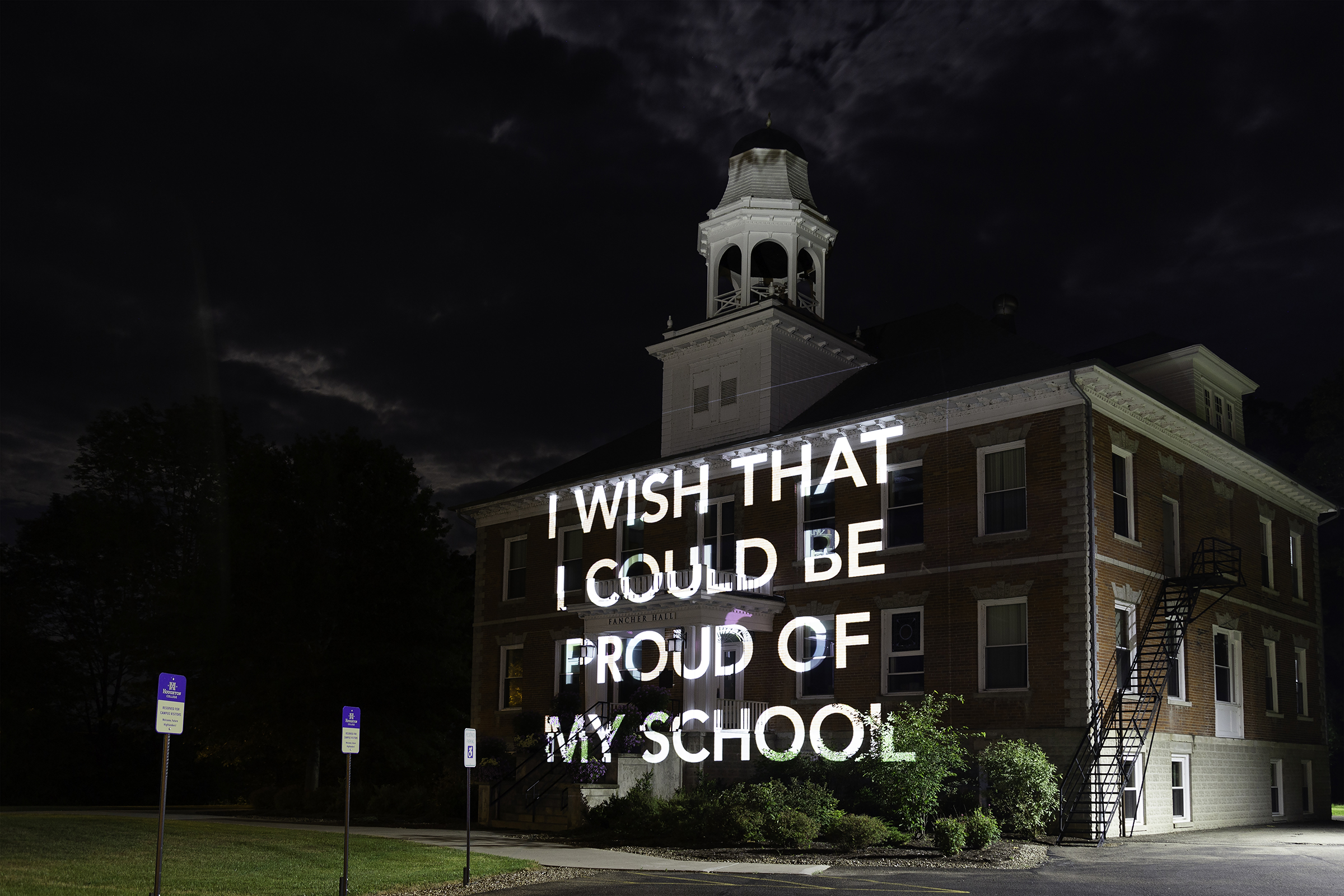
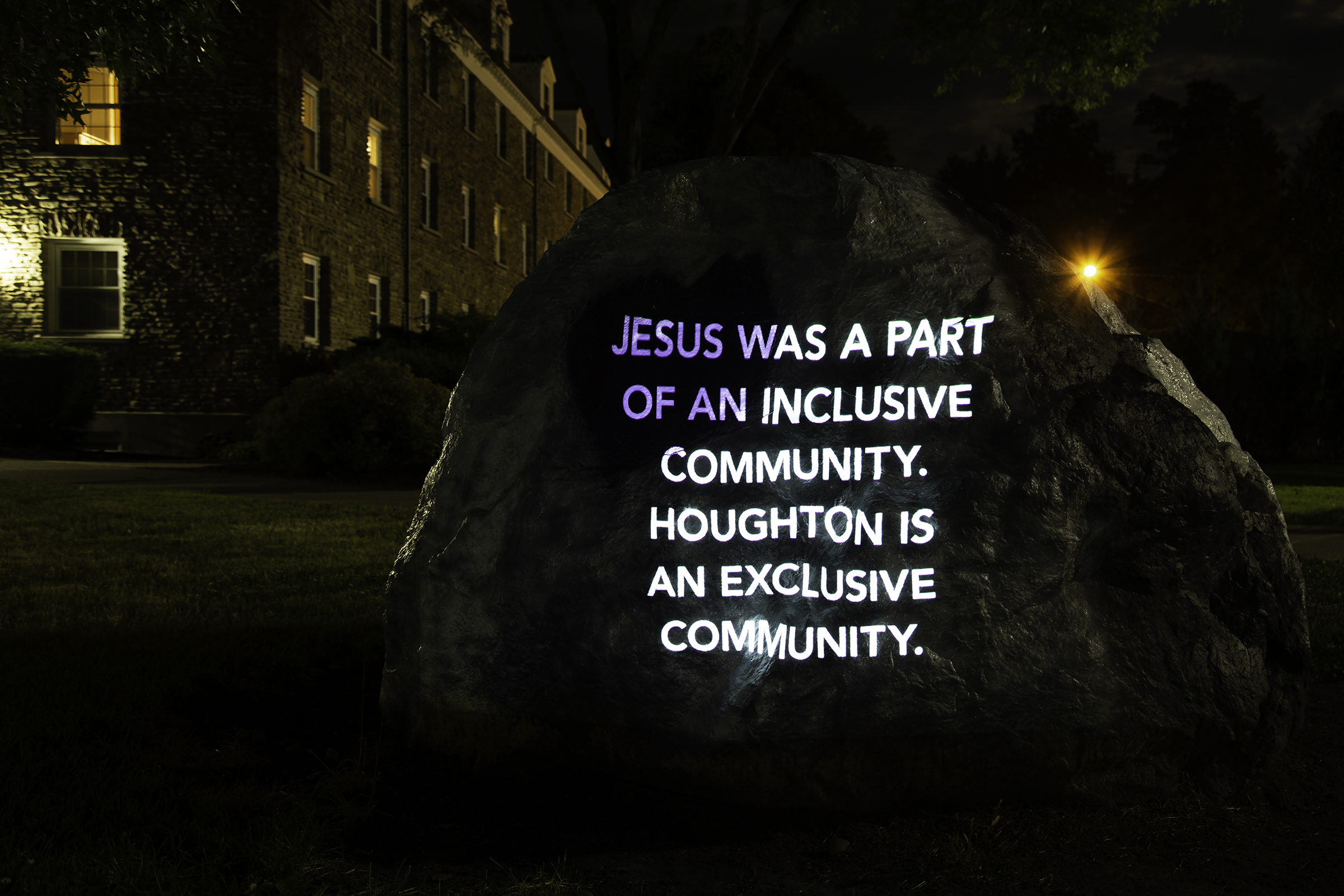
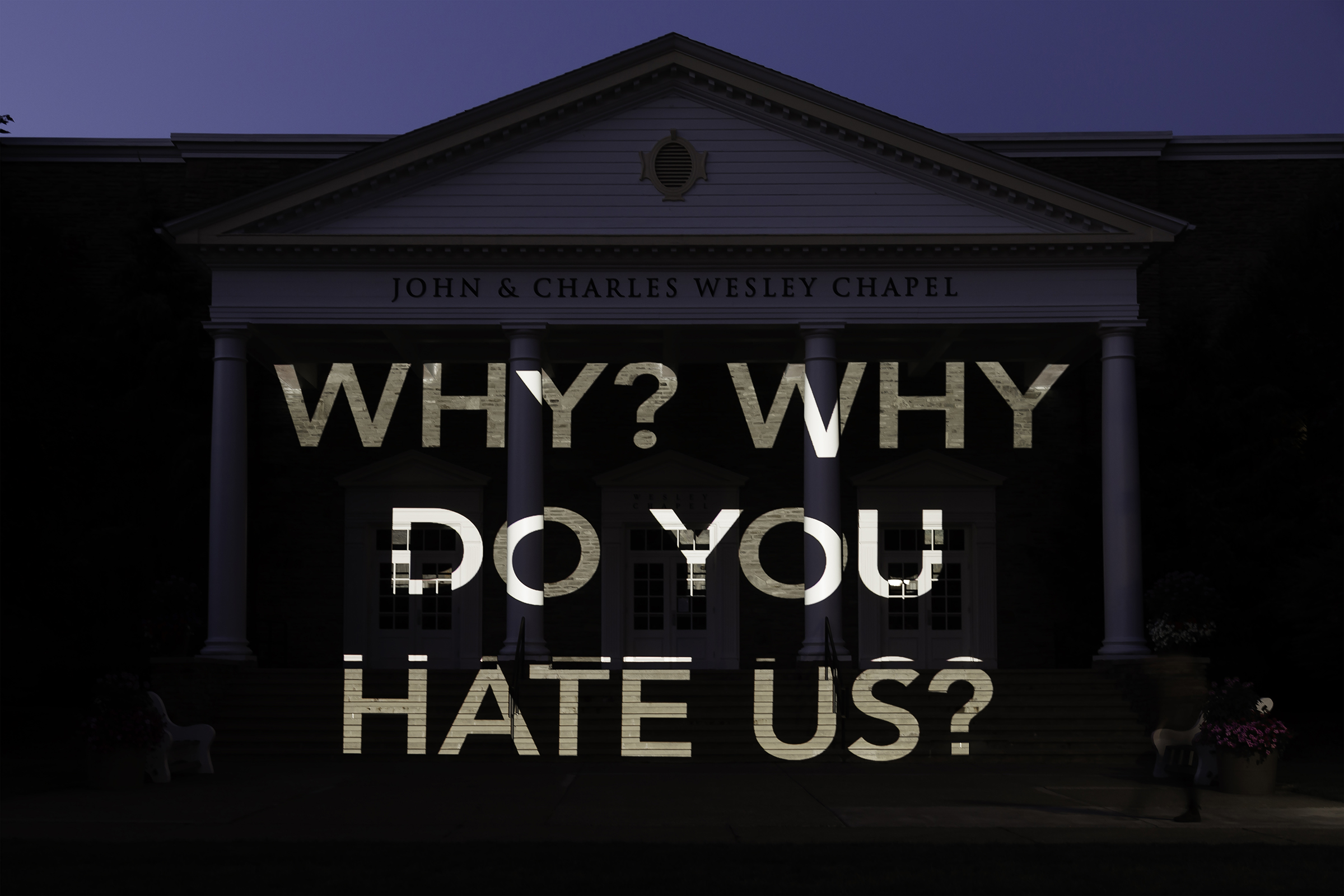
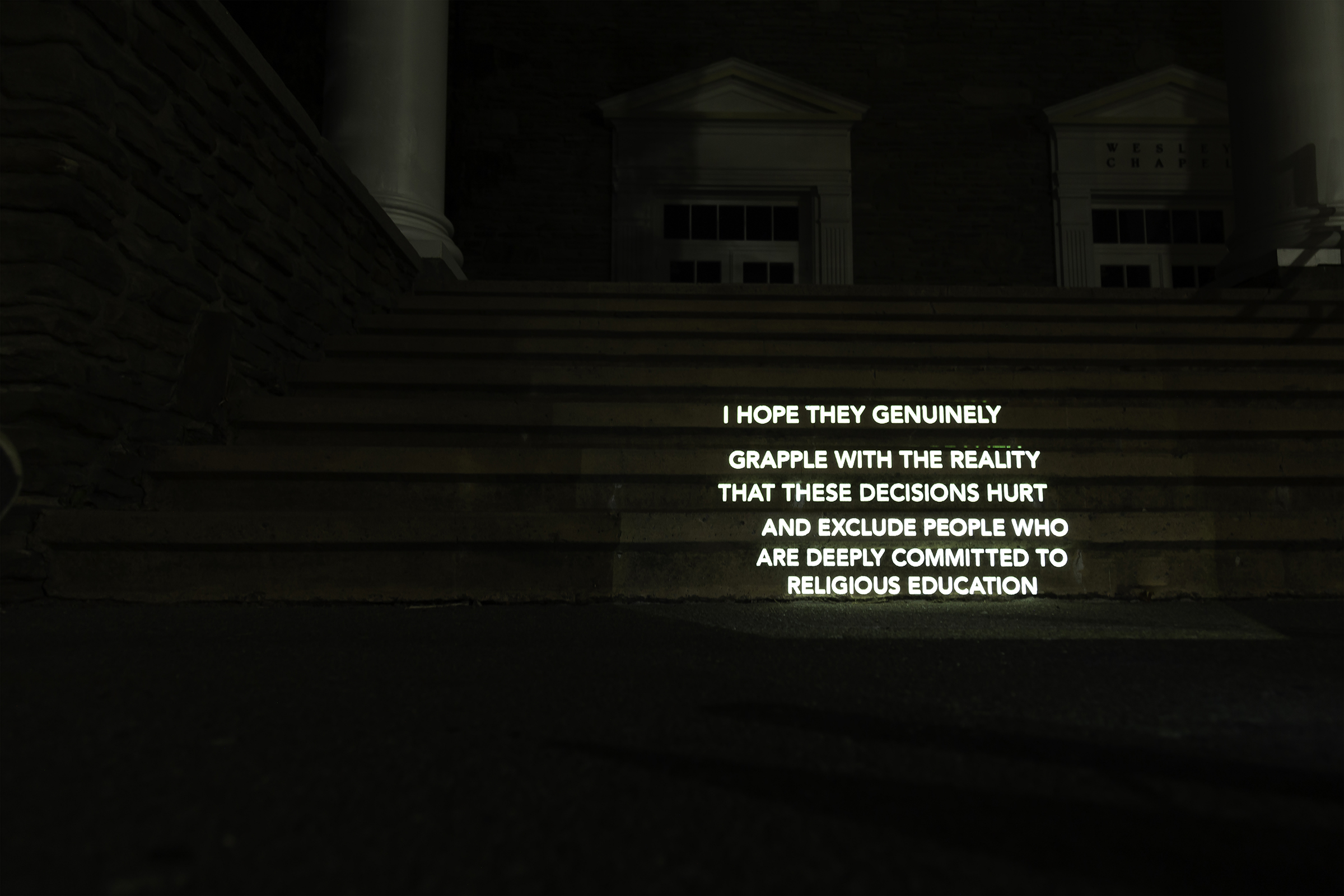
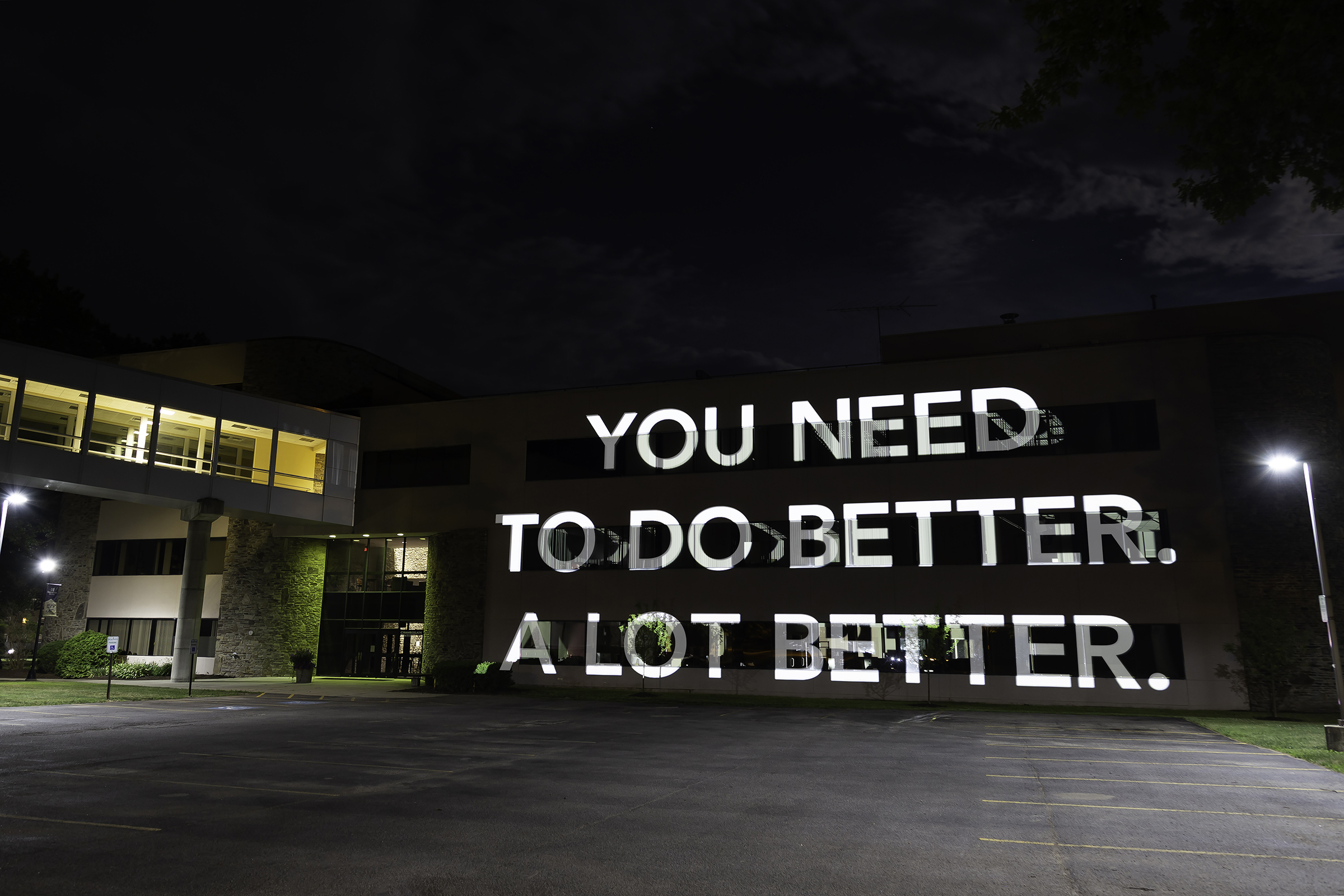
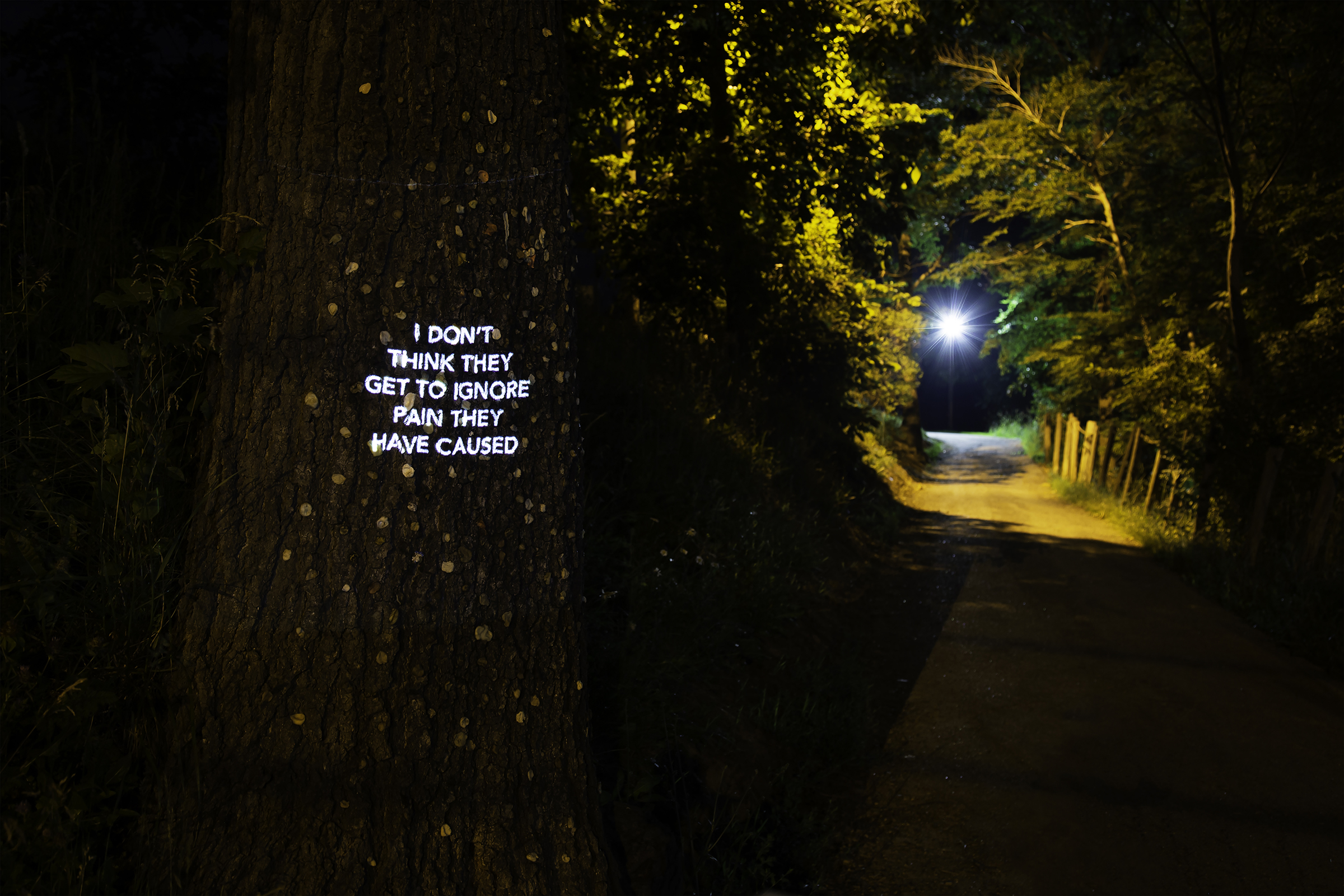
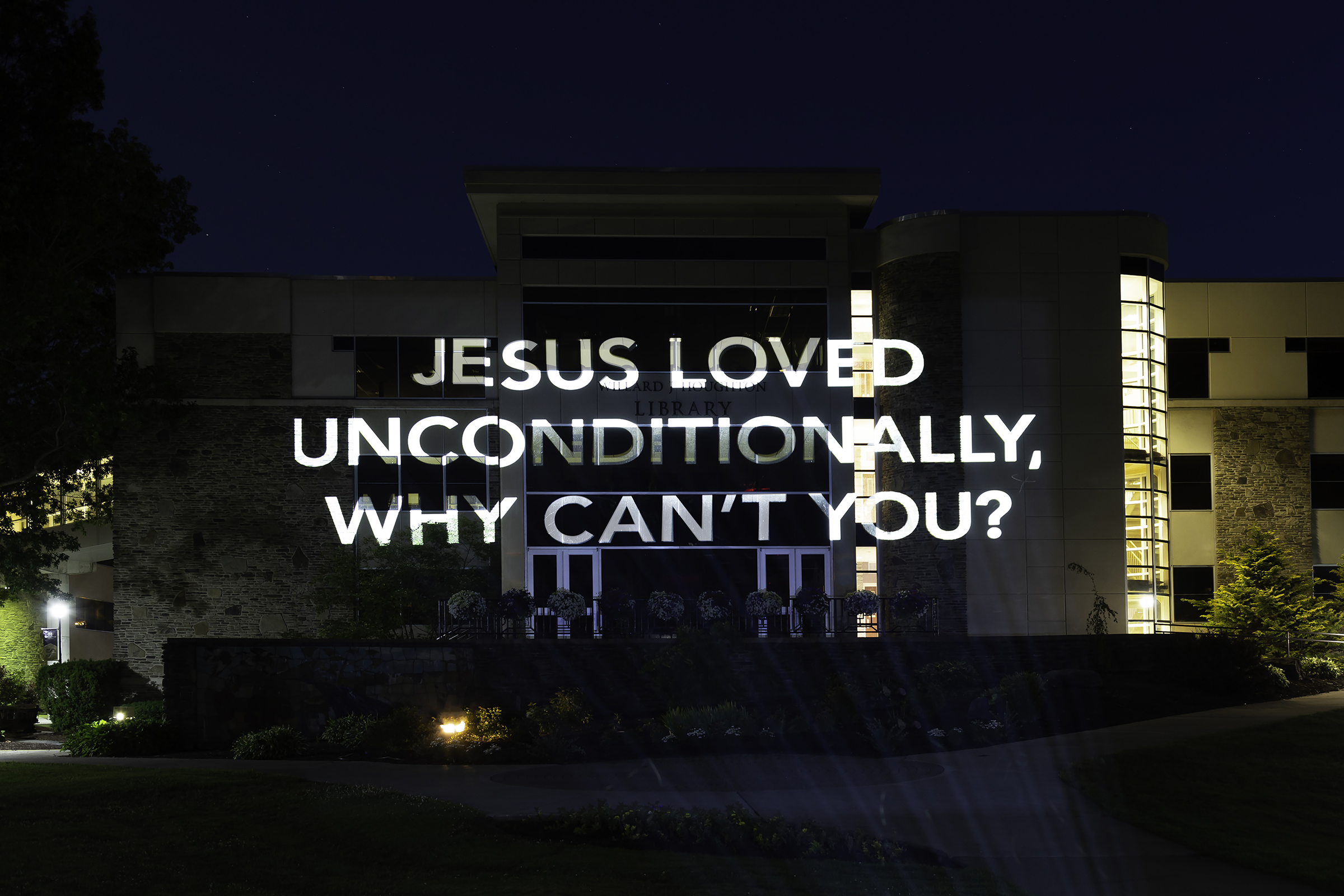
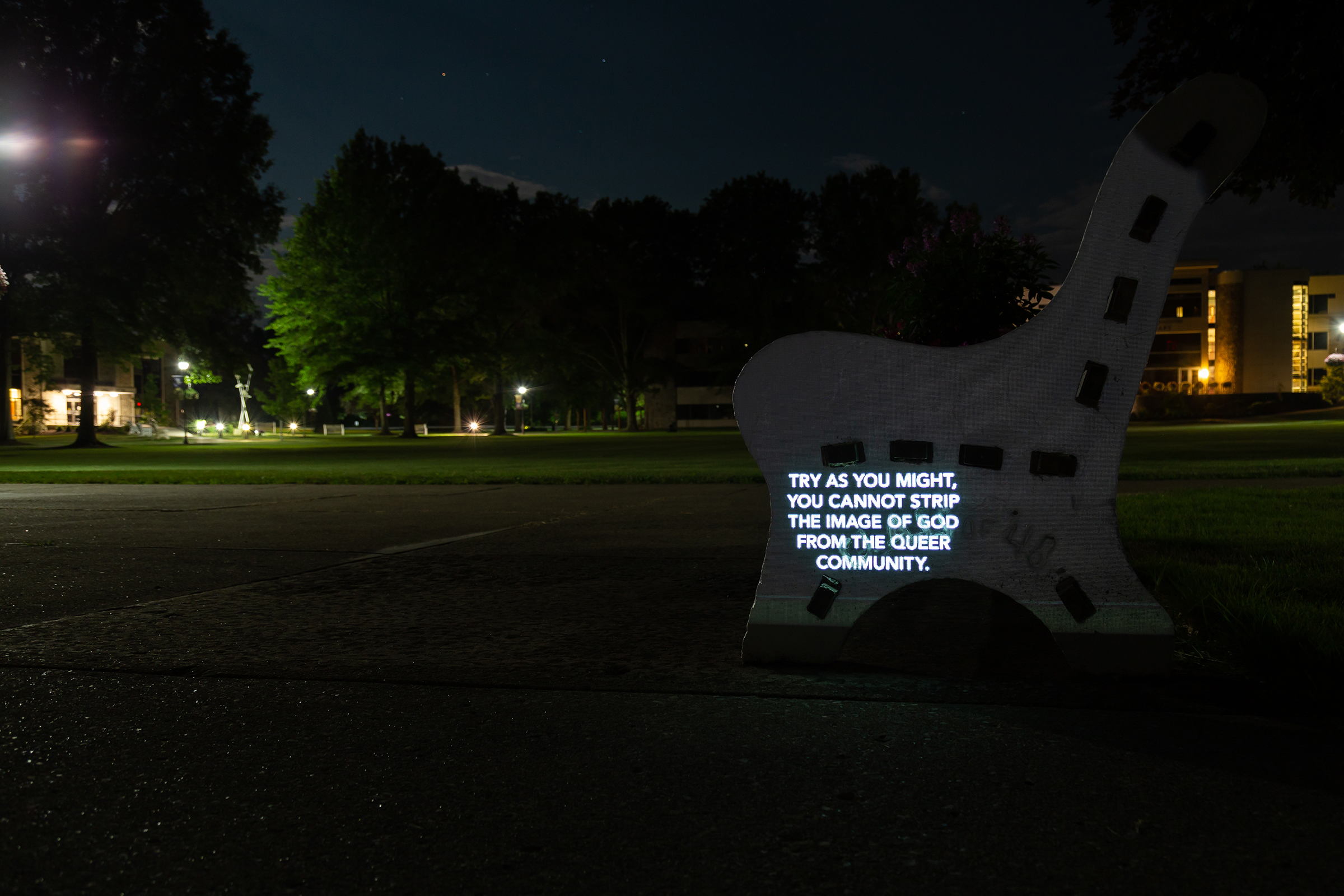
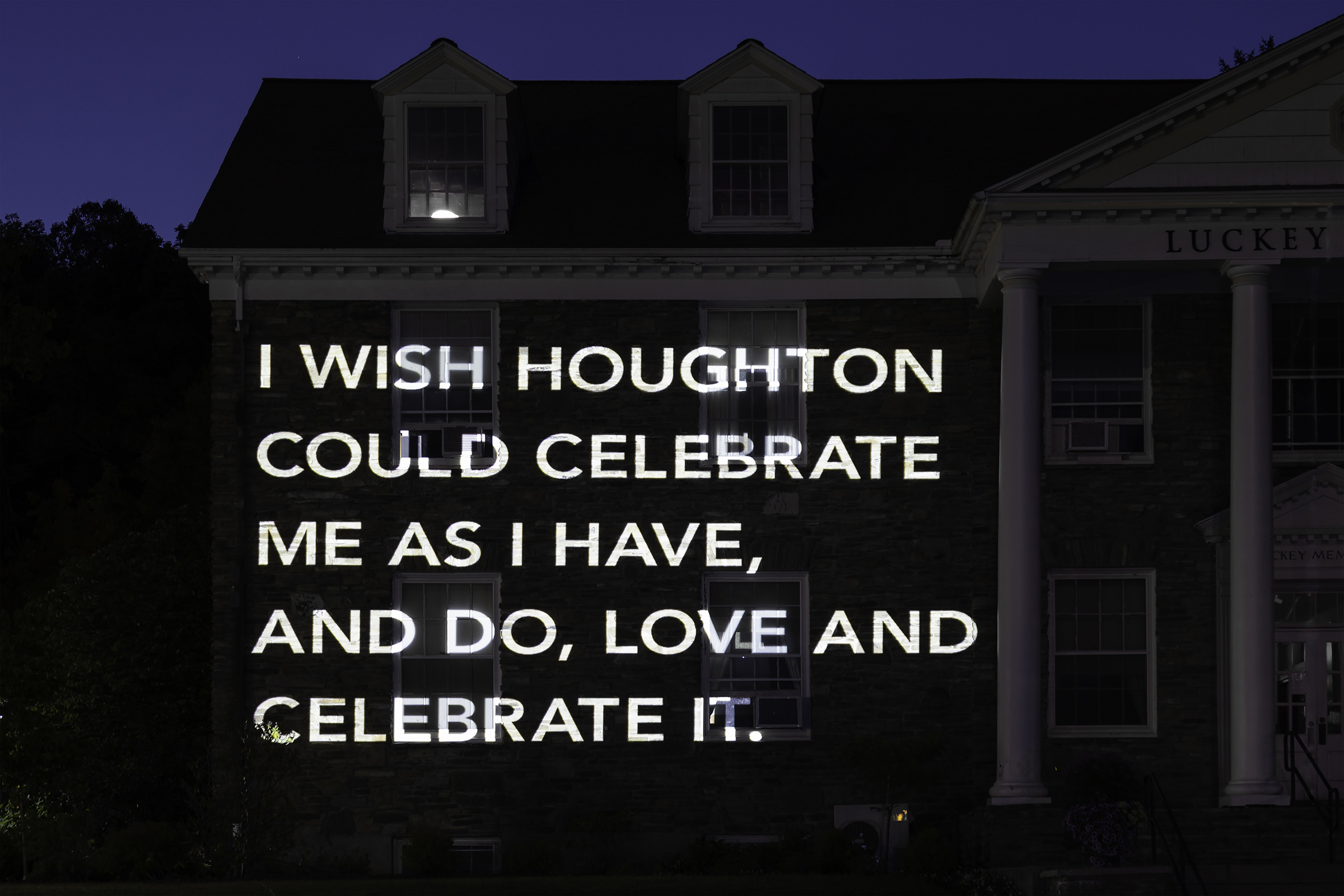
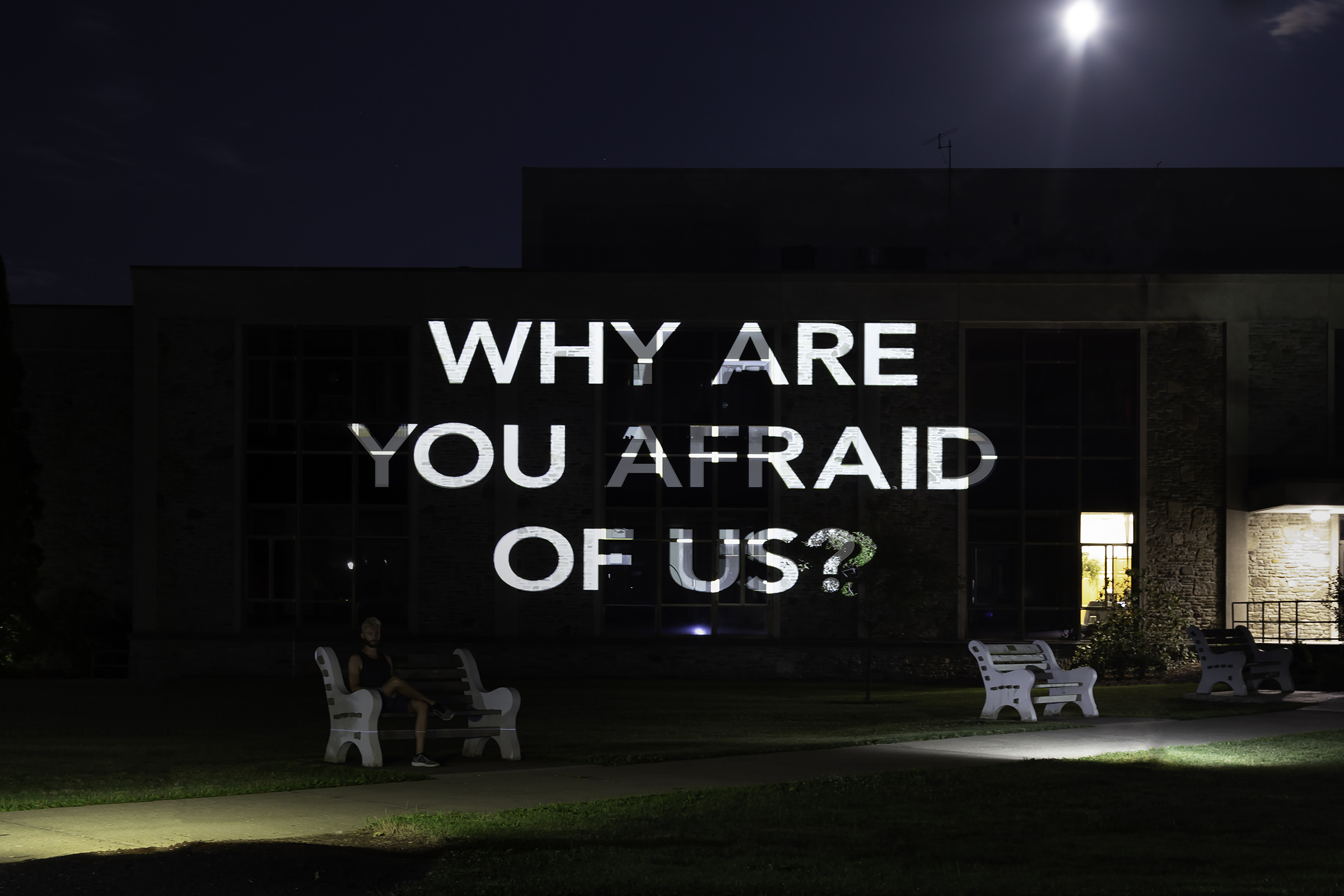
WE ARE ALL HOUGHTON
BY AMY JOON+ JOSHUA DUTTWEILERWe Are All Houghton was created in response to the experiences of LGBTQ+ students at Houghton University and the college’s involvement in the Supreme Court cases regarding the interpretation of Title VII and Title IX.
Artists Amy Joon and Joshua Duttweiler collaborated using light projections of quotes by LGBTQ+ alumni around Houghton’s campus. The goal of the piece is to amplify the voices of students who have felt marginalized in regard to their sexual orientation and/or gender identity by Houghton’s lack of inclusivity and their discriminatory policies, professors, and administration. The artists’ desire is to remind Houghton of the true meaning of “community” and to draw attention to the urgent need for Houghton to reassess their stance.
Artists Amy Joon and Joshua Duttweiler collaborated using light projections of quotes by LGBTQ+ alumni around Houghton’s campus. The goal of the piece is to amplify the voices of students who have felt marginalized in regard to their sexual orientation and/or gender identity by Houghton’s lack of inclusivity and their discriminatory policies, professors, and administration. The artists’ desire is to remind Houghton of the true meaning of “community” and to draw attention to the urgent need for Houghton to reassess their stance.
Presented during RECOLLECTIVE, an exhibition focusing on alumni voices, the artists desire to amplify current LGBTQ+ students’ voices through an anonymous online survey. Quotes from this form will be incorporated into the show using a projector to display current students’ voices next to the prints of the alumni’s words. In addition, this anonymous data will be presented to the college at the culmination of this show to give Houghton University important information that they have neglected to ascertain.
A survey was conducted to collect the experience of anyone with a connection to Houghton University whose sexual orientation and/or gender identity is unaccepted by the college.
A survey was conducted to collect the experience of anyone with a connection to Houghton University whose sexual orientation and/or gender identity is unaccepted by the college.
PARTICIPANTS
COLLIN BELT ‘15
B.A. Communications
He/him/his
Gay/Demisexual
B.A. Communications
He/him/his
Gay/Demisexual

As a queer person at Houghton, I felt afraid and isolated. I concealed my identity from others because the message I received was very clear: you are not allowed to share that aspect of yourself and be a part of this community. This fear and pressure was so intense that my mental health declined to the point where I nearly had to drop out. I realized that I couldn’t continue to pretend to be somebody that I wasn’t.
Coming out while a student at Houghton was one of the most difficult things that I have ever had to do. I had hoped to find acceptance — or at least tolerance — among my friends, and instead I had my worst fears confirmed. Many people at Houghton were ignorant and cruel. I lost most of the friends I had made, and I was repeatedly told that it was impossible to be queer and be a person of faith: that in the end, I would have to choose one or the other.
The people who told me that were wrong. It has been a difficult journey, but by being honest with myself about who I was and no longer pretending to be someone else, I learned how to love myself and grow closer with God. I found new friends at Houghton who accepted me for who I was, even if they didn’t fully understand it. I formed deeper friendships than I ever could have pretending to be someone else.
When you’re at Houghton, it’s easy to feel like it’s the whole world. It isn’t. When you leave Houghton, you realize that the world is a much bigger place and that there are good people who will love and support you. Wherever you are in your journey, please know that it really does get better. Your time at Houghton will end, and soon you’ll find that life opens up and becomes full of limitless possibilities.
Coming out while a student at Houghton was one of the most difficult things that I have ever had to do. I had hoped to find acceptance — or at least tolerance — among my friends, and instead I had my worst fears confirmed. Many people at Houghton were ignorant and cruel. I lost most of the friends I had made, and I was repeatedly told that it was impossible to be queer and be a person of faith: that in the end, I would have to choose one or the other.
The people who told me that were wrong. It has been a difficult journey, but by being honest with myself about who I was and no longer pretending to be someone else, I learned how to love myself and grow closer with God. I found new friends at Houghton who accepted me for who I was, even if they didn’t fully understand it. I formed deeper friendships than I ever could have pretending to be someone else.
When you’re at Houghton, it’s easy to feel like it’s the whole world. It isn’t. When you leave Houghton, you realize that the world is a much bigger place and that there are good people who will love and support you. Wherever you are in your journey, please know that it really does get better. Your time at Houghton will end, and soon you’ll find that life opens up and becomes full of limitless possibilities.
MITCH GALUSHA ‘14
B.A. Intercultural Studies
They/them
Gay
B.A. Intercultural Studies
They/them
Gay

I was always trying to be someone I wasn't. I dated girls and tried forcing myself to be straight because I had been told by my family and by Houghton that I was going to hell and that I was basically less than human and deserve less than a heterosexual male. Because of all of this, I became a very angry, insecure person. I lashed out at people to take the attention off of myself and hurt some very good people. If I could take it back, I would. I am a real, honest, person and the fact I had to hide who I was and hide from everyone made me angry.
SALLY JACOBY MURPHY ‘13
B.A. English, Art
She/her/hers
Lesbian
B.A. English, Art
She/her/hers
Lesbian

Sometimes it is easy to forget that there is a part of me that isn’t welcome at Houghton. I was born and raised in Houghton, as well as attending the school. And there I knew (and I know) so much love. I was loved wearing awkwardly large glasses with buck teeth running around the quad. I was loved as I sat at late night Christmas eve dinners with family friends who would later become college professors. I was loved as teachers stayed late after office hours to listen to my woes. I was loved by friends who sacrificed their sleep to laugh, to cry, to daydream, to think, to grow with me. Also, I met my wife at Houghton.
My wife, incidentally, is brilliant. She has an M-Div from Duke and likes to join theology book clubs for fun. She is exactly the kind of student Houghton likes to feature. Except she married me.
And I suppose that is problem. We LOVE Houghton. Most of our closest friends remain our Houghton friends and we count ourselves very lucky for the education we received there. But we also know, especially now that we are married, that there will always be a tension.
The tension that lives between our names being changed without our even asking (so thoughtful!) and yet knowing my brilliant wife will never, no matter her accomplishments, be asked to be a guest speaker. That tension that lives between professors and community members we didn’t even invite to our wedding sending us gifts and cards to show their support (which meant more than I can ever say), while hiring individuals who don’t mind mixing a little bigotry in with their chapel talk.
I won’t pretend to know the answer. I know the reality is complicated. Complicated with politics, with funding, with over a hundred years of church relations, with doctrine, with interpretation, with academic freedom, with simple differences in opinion.
But I also won’t pretend it doesn’t hurt.
I will continue to love Houghton. I will continue to be grateful for the love and the people I carry I with me wherever I go. I will continue to celebrate this place that, in every way, made me…me.
And one day I hope that there will be a me who can be loved, be educated, and be celebrated wholly, fully, without the rest.
My wife, incidentally, is brilliant. She has an M-Div from Duke and likes to join theology book clubs for fun. She is exactly the kind of student Houghton likes to feature. Except she married me.
And I suppose that is problem. We LOVE Houghton. Most of our closest friends remain our Houghton friends and we count ourselves very lucky for the education we received there. But we also know, especially now that we are married, that there will always be a tension.
The tension that lives between our names being changed without our even asking (so thoughtful!) and yet knowing my brilliant wife will never, no matter her accomplishments, be asked to be a guest speaker. That tension that lives between professors and community members we didn’t even invite to our wedding sending us gifts and cards to show their support (which meant more than I can ever say), while hiring individuals who don’t mind mixing a little bigotry in with their chapel talk.
I won’t pretend to know the answer. I know the reality is complicated. Complicated with politics, with funding, with over a hundred years of church relations, with doctrine, with interpretation, with academic freedom, with simple differences in opinion.
But I also won’t pretend it doesn’t hurt.
I will continue to love Houghton. I will continue to be grateful for the love and the people I carry I with me wherever I go. I will continue to celebrate this place that, in every way, made me…me.
And one day I hope that there will be a me who can be loved, be educated, and be celebrated wholly, fully, without the rest.
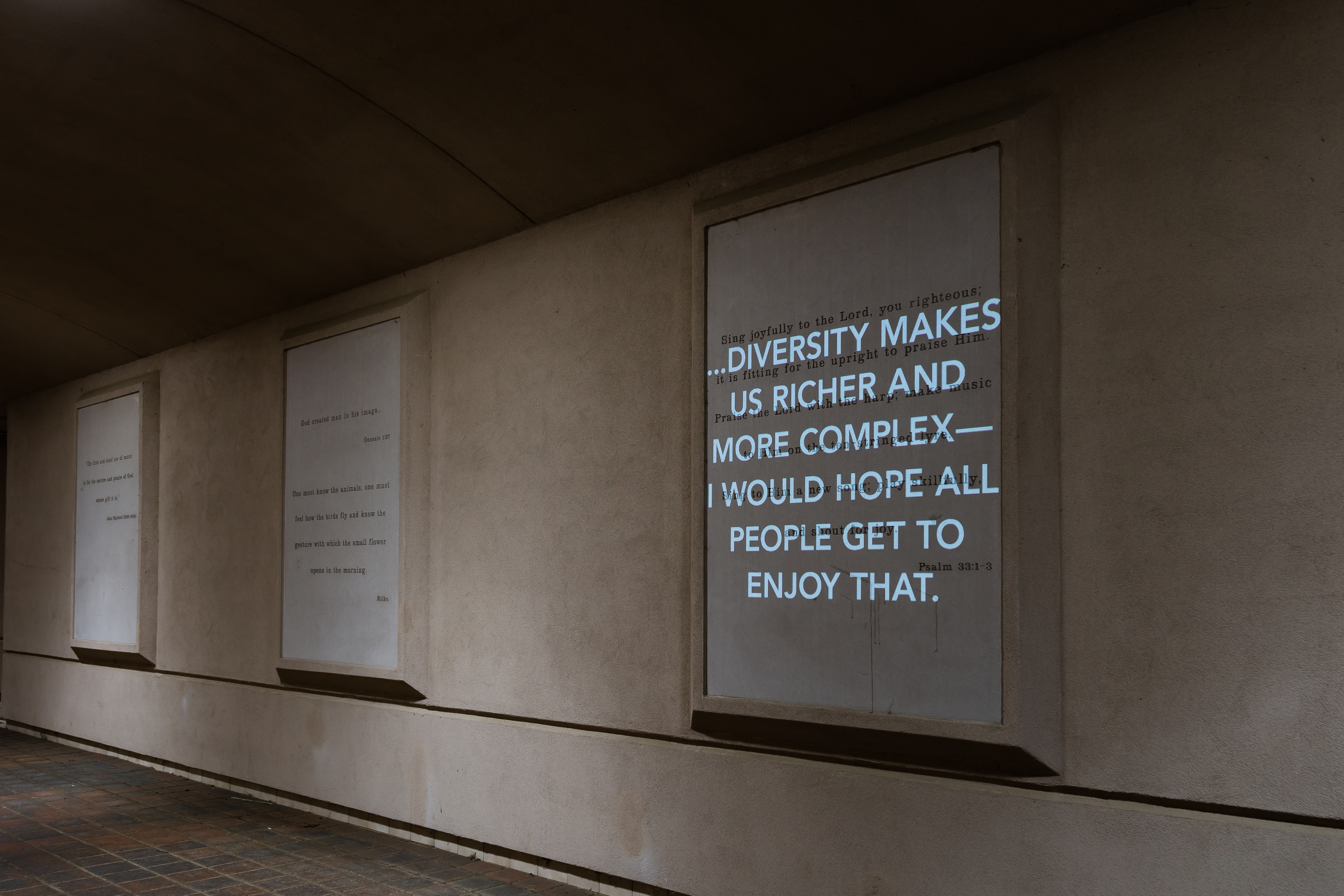
A few months ago we celebrated my Dad’s birthday. We went to an iris farm (my Mom’s favorite). This iris farm specializes in hybrid colors. So instead of your average white or yellow or purple, it also has pink and peach and red and blue and mixtures of the colors and every hue you can imagine. I would find one color I thought was my favorite and then see another and melt all over again, and then return to the one before seeing it’s beauty again as if for the first time.
It’s super cheesy- but that’s what diversity does. It keeps showing you what beauty is. You think you have found the most beautiful culture, most beautiful expression, most beautiful idea, and then you find another and the cycle repeats endlessly. It makes the world brighter and more interesting and more full of life.
The LGBTQ community is part of this. Ask any Queer person- their first Pride was one of the most joyous things they have ever experienced. It is full of color and celebration and everyone just LOVING everyone! We wear glitter in our hair and clothes that reflect the sun because we know we have to create our own light in a world that has been dark to us.
Truthfully, I am a home body who prefers muted color tones and hot tea and bulky sweaters and quiet conversation with a couple of good friends. But I am so grateful for my Queer community who taught me to shine light through my finger tips and love through my soul. Who taught me it’s more important to celebrate than to despair.
I want that for Houghton. I want that for everyone.
And I want it in all ways- not just for the LGBTQ community but for all aspects of Diversity. Find the things that each culture and each person has that makes it a place more full of color and nuance. Houghton is great at asking questions, it just needs to learn how to embrace the diverse answers.
It’s super cheesy- but that’s what diversity does. It keeps showing you what beauty is. You think you have found the most beautiful culture, most beautiful expression, most beautiful idea, and then you find another and the cycle repeats endlessly. It makes the world brighter and more interesting and more full of life.
The LGBTQ community is part of this. Ask any Queer person- their first Pride was one of the most joyous things they have ever experienced. It is full of color and celebration and everyone just LOVING everyone! We wear glitter in our hair and clothes that reflect the sun because we know we have to create our own light in a world that has been dark to us.
Truthfully, I am a home body who prefers muted color tones and hot tea and bulky sweaters and quiet conversation with a couple of good friends. But I am so grateful for my Queer community who taught me to shine light through my finger tips and love through my soul. Who taught me it’s more important to celebrate than to despair.
I want that for Houghton. I want that for everyone.
And I want it in all ways- not just for the LGBTQ community but for all aspects of Diversity. Find the things that each culture and each person has that makes it a place more full of color and nuance. Houghton is great at asking questions, it just needs to learn how to embrace the diverse answers.
SARAH JACOBY MURPHY ‘13
B.A. Religion
She/her/hers
Bi/queer
B.A. Religion
She/her/hers
Bi/queer

Houghton's position in this case isn't surprising, but it does reiterate the boundary lines of the community that sits at the core of Houghton's identity. As an openly LGBTQ alumna I am well aware that I will not have the same opportunities as alumni who are straight (even if they are affirming of LGBTQ people) or intentionally celibate. A small example of this is that my wife and I didn’t submit our wedding to the alumni notes section of Houghton magazine because we assumed they wouldn’t publish it. Some larger examples: I doubt that a queer alum would ever be invited to serve on one of Houghton's boards or speak in chapel, even if they had the credentials and experiences to qualify. When I came out, this shift in my relationship with Houghton was something that I grieved - I knew that my connection to a place I love and hoped to stay involved with was going to be permanently altered. However in the end I don’t want Houghton to change their position because they 'feel bad' or due to federal policy or a lawsuit - I want them to be genuinely transformed in their thinking. Coming out is an act of integrity, and I hope someday my alma mater's integrity includes its queer alumni.
ANONYMOUS

The inability to speak about sexuality openly and in an informed way lead to much fear, confusion, and anxiety in my own life, often for reasons I didn’t even understand. It wasn’t until after leaving Houghton that I realized that I was gay because I had repressed my sexuality so thoroughly. Being at Houghton lead me to believe that Christianity and homosexuality were at absolute odds with each other and that to be gay was to be a sinner and for that I was so ashamed. My repression and fear of myself lead me to act out in unkind ways to those around me that were also queer and for that I am very sorry.
So much of my reaction and the reaction of other Christians around me, including my own family, has been out of fear. Fear that breaking the status-quo somehow undermines the foundation of Christianity. If that were true, how weak is our faith?
So much of my reaction and the reaction of other Christians around me, including my own family, has been out of fear. Fear that breaking the status-quo somehow undermines the foundation of Christianity. If that were true, how weak is our faith?
HOLLY CHAISSON ‘16
B.A. Philosophy
They/them/theirs
Nonbinary
B.A. Philosophy
They/them/theirs
Nonbinary

Due largely to my own conservative evangelical upbringing, I arrived at Houghton terrified of being—or even being perceived as—anything other than straight. Over the next four years I discovered that my fears were well-founded. For simply expressing their sexuality or gender identity as anything other than heterosexual and cisgender, my friends and peers were verbally harassed, demeaned, and forced to form a community in secret for fear of retaliation. And as I would eventually learn, some faced even more severe consequences. During my tenure as editor-in-chief of The Houghton Star I made the decision, alongside my staff, to publish a series of op-eds featuring the stories of LGBTQ+ alumni. We called the series “Being Queer at Houghton,” and though it grew to host an intense, year-long dialogue, it primarily served the purpose to center the experiences of LGBTQ+ Houghtonites in a way they had never been. One consequence of this was that my writers and I exposed ourselves (and the campus) to bigotry and hatred in the form of caustic letters to the editor, unsolicited tirades in the hallways, and accusations of “a homosexual agenda.” But all things considered, the costs never outweighed the benefit of the work we did on behalf of the Houghton LGBTQ+ community both on and off campus. Despite the fact that I was never officially “out” during my four years (though rumors abounded), I felt a strong sense of responsibility to stand up for the LGBTQ+ community, and I’m thankful for the opportunity I had to do so alongside so many others. I have no doubt that advocating on behalf of the queer community as a Houghton student gave me the courage to finally come out myself years later, and to this day, it’s the season in my life I’m most proud of.
ANONYMOUS

What I learned from my time at Houghton is that some of the most horrible things that happen to us don't always happen in a dramatic cataclysmic way. It can happen in the most subtle ways: In hearing about my friend's experience losing an RA job because he identified as LGBTQ+; In constantly feeling that I was being policed about my sexuality all throughout Freshman year, and then taking it upon myself to monitor my own behavior and mannerisms so that I wouldn't be questioned; In sometimes absorbing the tenor of the conversations around me and internalizing the oppressive rhetoric that enveloped me, and regurgitating it to others and sometimes to no one in particular.

Jesus accepts everyone into his community. He accepts saints and sinners and never once turned away the undesirables. Being transgender has essentially made me an undesirable, an outcast, a leper. Upon discovering my true self and sharing what should have been happy, celebration-worthy news, I found that most of my closest friends from Houghton abandoned me. My housemates and many other friends have not spoken to me since coming out. The thought of returning to Houghton fills with me with discomfort, and I do not think I would be welcome on campus. I could very easily blend in amongst other women, but just knowing that their hearts would be hardened if they knew who I was makes returning an unappealing thought. Jesus would have celebrated me for who I am, for who God made me. He wouldn’t have left me alone. He would have welcomed me into his community as the woman that I have grown into.
SUPPORTING DOCUMENTS + RESOURCES
WHAT IS TITLE VII AND WHAT DOES IT HAVE TO DO WITH HOUGHTON COLLEGE?
By Holly Chaisson ‘16
In August 2020, the Supreme Court decided its blockbuster Title VII cases: No. 17-1618 Bostock v. Clayton County, Georgia; No. 17-1623, Altitude Express, Inc. v. Zarda; and No. 18-107, R.G & G.R. Harris Funeral Homes, Inc. v. Stephens. Writing for the majority, Justice Neil Gorsuch concluded that firing an employee merely for being gay or transgender constitutes a violation of Title VII of the Civil Rights Act of 1964. This case is important because it establishes that Title VII’s ban on discrimination on the basis of sex covers and protects LGBTQ+ employees.
In August 2019 it became apparent to a group of alumni that Houghton College had become involved as an amicus curiae in these cases. An amicus curiae is a party who files a brief in a case as a “friend of the court” to provide insight or a perspective on a case that the court might not have otherwise considered or been aware of. This amicus brief was filed in support of the employers in these cases and took a distinctive position on this particular question: “Whether sex discrimination prohibited by Title VII of the Civil Rights Act of 1964 extends to sexual orientation or gender identity.” The named amici curiae signing this brief included the Council for Christian Colleges & Universities, The Catholic University of America, Brigham Young University, and 39 Additional Religious Colleges and Universities, including Houghton College.
The position taken by amici (including Houghton College) in this brief was that the language in Title VII (and relatedly, Title IX) does not, and should not be extended by these cases, to include protection for LGBTQ employees. Amici went on to suggest that “[t]he important task of deciding whether and how to address the issue of LGBTQ discrimination in employment properly belongs with Congress, not the courts.”
In August 2019 it became apparent to a group of alumni that Houghton College had become involved as an amicus curiae in these cases. An amicus curiae is a party who files a brief in a case as a “friend of the court” to provide insight or a perspective on a case that the court might not have otherwise considered or been aware of. This amicus brief was filed in support of the employers in these cases and took a distinctive position on this particular question: “Whether sex discrimination prohibited by Title VII of the Civil Rights Act of 1964 extends to sexual orientation or gender identity.” The named amici curiae signing this brief included the Council for Christian Colleges & Universities, The Catholic University of America, Brigham Young University, and 39 Additional Religious Colleges and Universities, including Houghton College.
The position taken by amici (including Houghton College) in this brief was that the language in Title VII (and relatedly, Title IX) does not, and should not be extended by these cases, to include protection for LGBTQ employees. Amici went on to suggest that “[t]he important task of deciding whether and how to address the issue of LGBTQ discrimination in employment properly belongs with Congress, not the courts.”
Amicus Br. 3. Amici disagree with the findings of the Sixth, Second, and Eleventh Circuits below that “‘discrimination on the basis of transgender and transitioning status’ constitutes sex discrimination because ‘it is analytically impossible to fire an employee based on that employee’s status as a transgender person without being motivated, at least in part, by the employee’s sex,’” (Amicus Br. 12 (citing Stephens Pet. App. 23a)); and that “discrimination based on sexual orientation is ‘sex’ discrimination because ‘one simply cannot consider an individual’s sexual orientation without first considering his sex.’” (Amicus Br. 14 (citing Bostock Pet. Br. 13)).
Upon discovering the college’s involvement in these critical cases, a group of Houghton alumni penned and sent a letter to President Mullen expressing their frustration with the college’s lack of transparency regarding their involvement and how alumni interpreted this brief to be yet another example of Houghton’s harmful and discouraging attitude toward LGBTQ+ students. President Mullen responded and offered an explanation for Houghton’s involvement: “The reason that Houghton signed onto the Amicus brief was to say that the petitioner’s claims should be reviewed in Congress…The question at stake is whether the very best way to provide protection for LGBTQ persons is to ground that protection in the definition of ‘sex’ as that was established in Title VII and Title IX…The real question addressed in the CCCU [amicus] brief is in which forum those issues can best be resolved.” The original letter and the response can be read below.
Upon discovering the college’s involvement in these critical cases, a group of Houghton alumni penned and sent a letter to President Mullen expressing their frustration with the college’s lack of transparency regarding their involvement and how alumni interpreted this brief to be yet another example of Houghton’s harmful and discouraging attitude toward LGBTQ+ students. President Mullen responded and offered an explanation for Houghton’s involvement: “The reason that Houghton signed onto the Amicus brief was to say that the petitioner’s claims should be reviewed in Congress…The question at stake is whether the very best way to provide protection for LGBTQ persons is to ground that protection in the definition of ‘sex’ as that was established in Title VII and Title IX…The real question addressed in the CCCU [amicus] brief is in which forum those issues can best be resolved.” The original letter and the response can be read below.
DOCUMENTS
WE ARE ALL HOUGHTON
OPEN LETTER TO THE PRESIDENT, 2022
HOUGHTON’S RESPONSE
- Called to Embrace and Serve - Response to Open Letter, March 5, 2021
- President Mullen’s Letter in Response to the Survey Data, December 7, 2020
-
Chapel, October 5, 2020
- Family Dinner Conversation, Homecoming Panel, October 2, 2020
- President Mullen’s Open Letter, September 11, 2020
SUPREME COURT CASE
LETTER TO THE PRESIDENT, 2019
HOUGHTON STAR
- https://www.houghtonstar.com/2020/10/05/we-are-all-houghton-project-challenges-school-to-listen-to-past-and-present-lgbtq-experiences-at-houghton/
- https://www.houghtonstar.com/2017/04/11/covenant-revisions-progress/
- https://www.houghtonstar.com/2016/11/11/revisions-to-covenant-proposed/
- https://www.houghtonstar.com/2016/11/17/sga-rejects-covenant-revisions/
- https://www.houghtonstar.com/2016/12/02/covenant-edits-approved/
- https://www.houghtonstar.com/2015/03/12/lgbq-inclusion-community-covenant-amendment/
- https://www.houghtonstar.com/2015/12/03/being-queer-at-houghton-adam-reinhardt-11/
- https://www.houghtonstar.com/2023/04/14/mosaic-center-closing/
HOUGHTON COLLEGE STUDENT GUIDE
RESOURCES FOR LGBTQ+ STUDENTS
PRESS